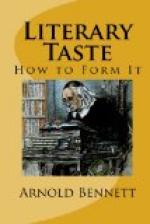Still, for your own sake you must confine yourself for a long time to recognised classics, for reasons already explained. And though you should not follow a course, you must have a system or principle. Your native sagacity will tell you that caprice, left quite unfettered, will end by being quite ridiculous. The system which I recommend is embodied in this counsel: Let one thing lead to another. In the sea of literature every part communicates with every other part; there are no land-locked lakes. It was with an eye to this system that I originally recommended you to start with Lamb. Lamb, if you are his intimate, has already brought you into relations with a number of other prominent writers with whom you can in turn be intimate, and who will be particularly useful to you. Among these are Wordsworth, Coleridge, Southey, Hazlitt, and Leigh Hunt. You cannot know Lamb without knowing these men, and some of them are of the highest importance. From the circle of Lamb’s own work you may go off at a tangent at various points, according to your inclination. If, for instance, you are drawn towards poetry, you cannot, in all English literature, make a better start than with Wordsworth. And Wordsworth will send you backwards to a comprehension of the poets against whose influence Wordsworth fought. When you have understood Wordsworth’s and Coleridge’s Lyrical Ballads, and Wordsworth’s defence of them, you will be in a position to judge poetry in general. If, again, your mind hankers after an earlier and more romantic literature, Lamb’s Specimens of English Dramatic Poets Contemporary with Shakspere has already, in an enchanting fashion, piloted you into a vast gulf of “the sea which is Shakspere.”




